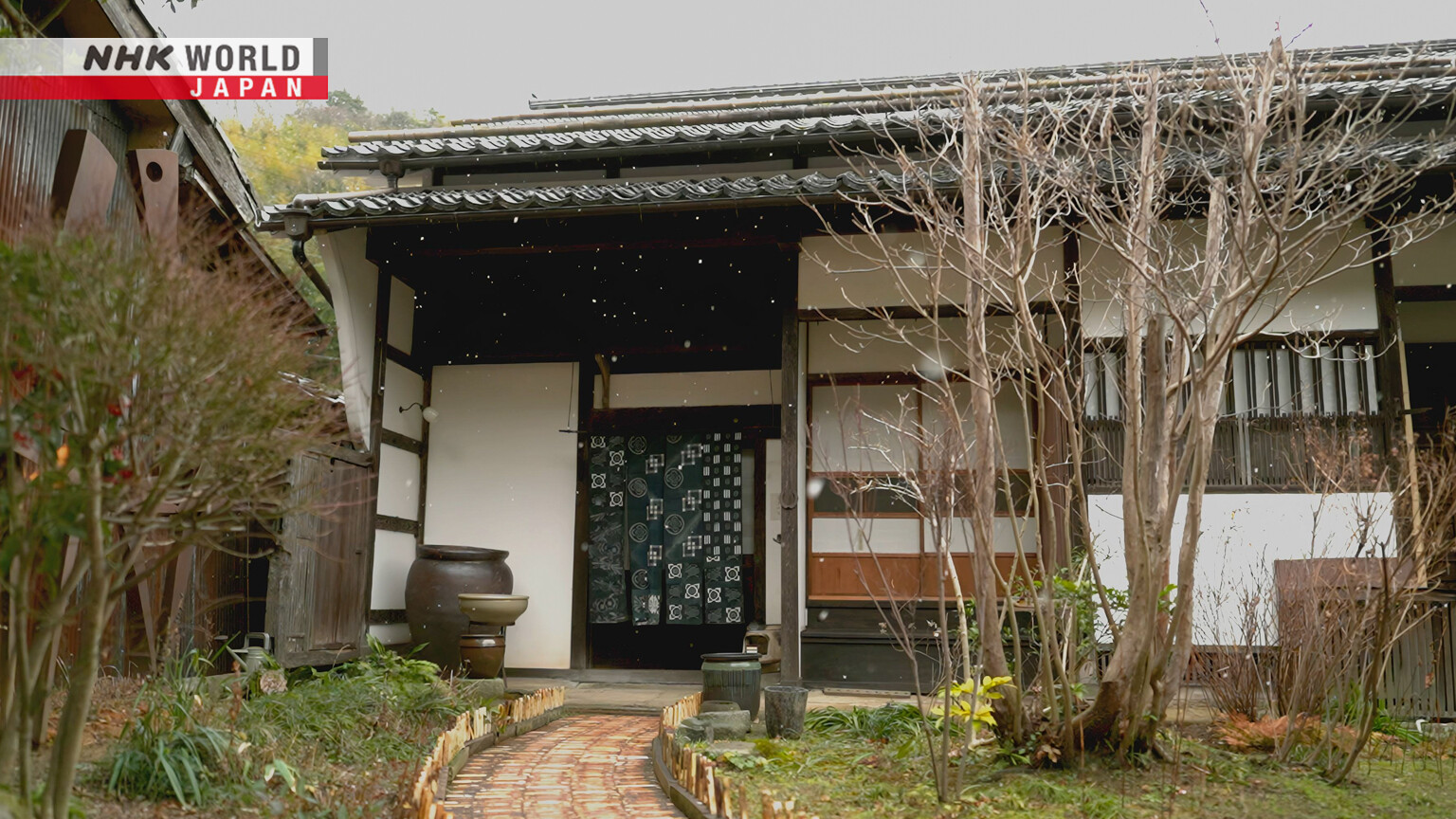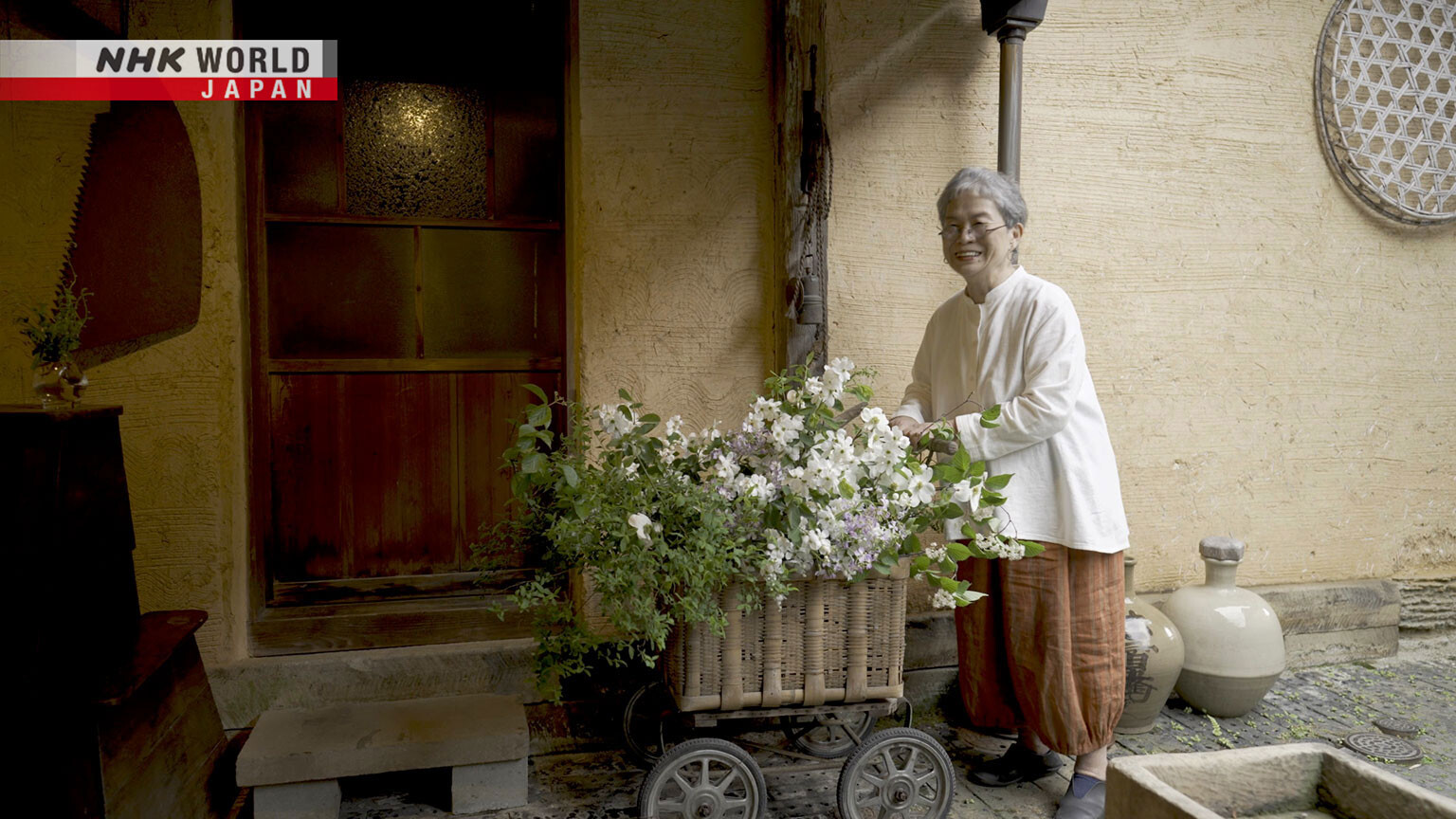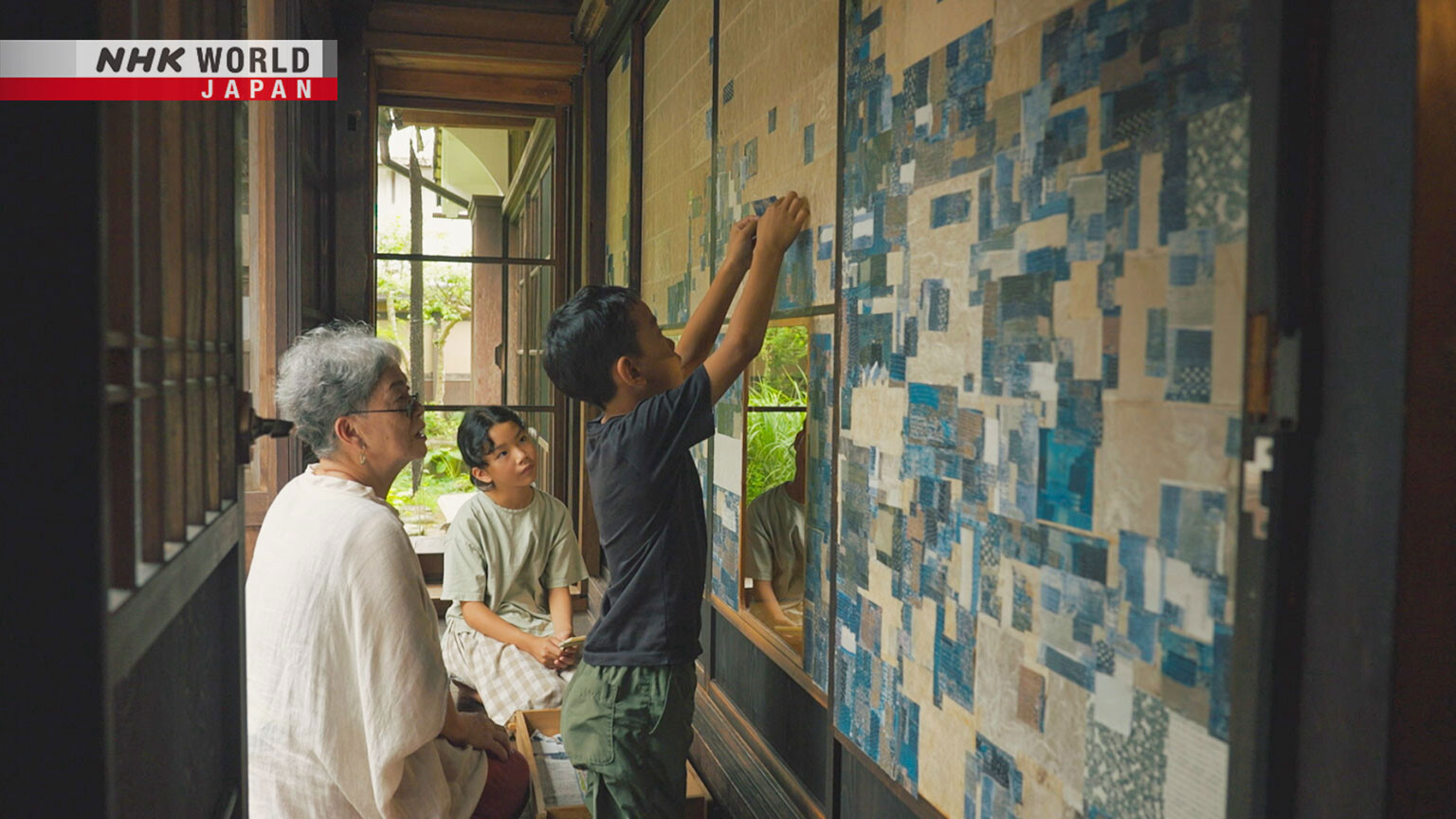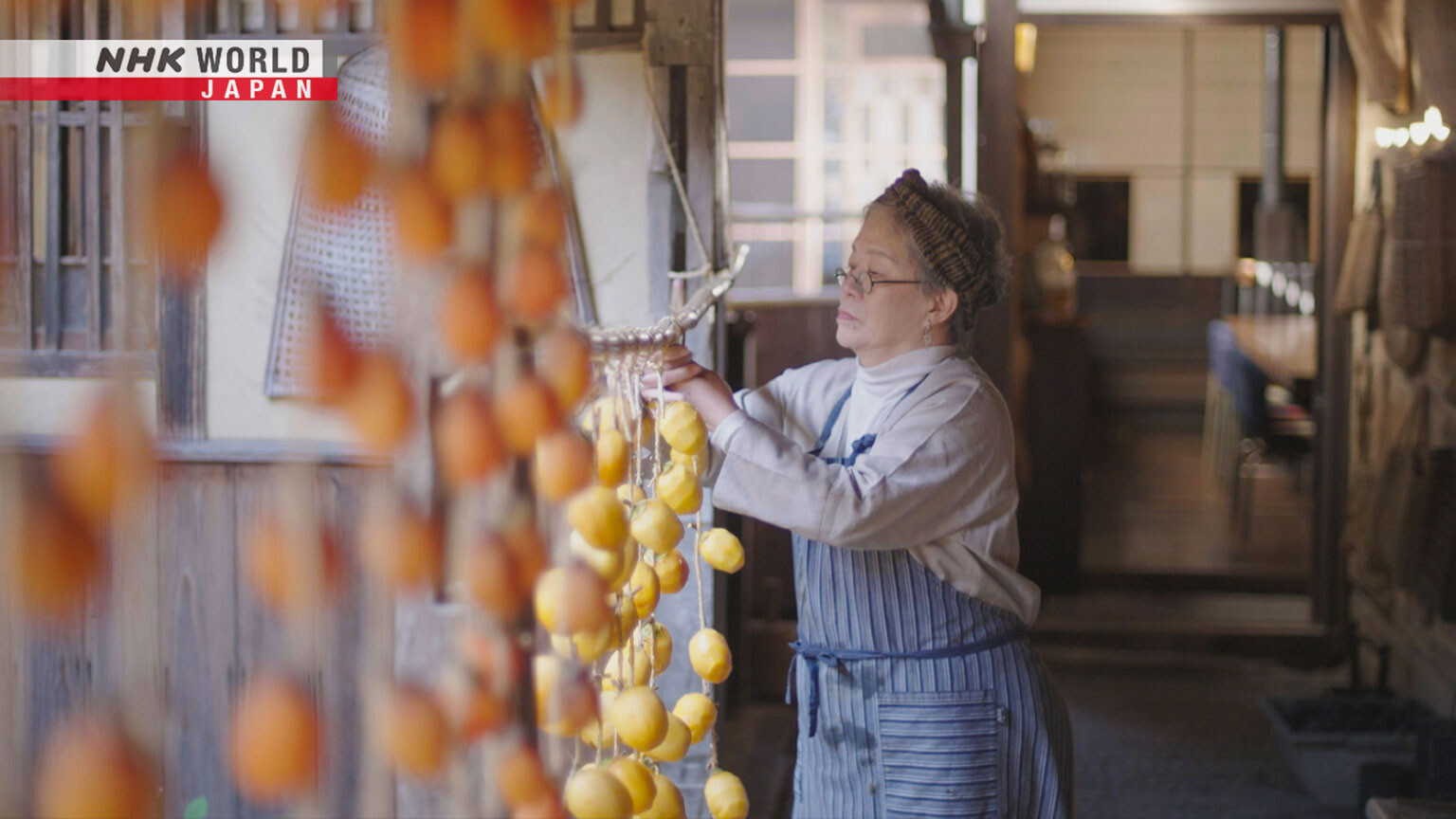Folk House Inn: Four Seasons [Special Edition]
In a small mountain town Matsuba Tomi runs a folk house inn. Using scrap material and discarded items she's created a space to enjoy the bounty of nature. A year in the life of a folk house inn.




Transcript
Since ancient times, the Japanese have believed that a life force resides in all creations.
Valuing and caring for the things we use,
a "Zero Waste Life."
Pointing the way to better living for a new era.
There's a belief in Japan that objects used with care have their own souls.
And I can definitely sense that.
So at my inn, I ask guests to feel it too, to try and hear what the house is saying.
An inn run in an old folk house, where "Zero Waste" is truly a way of life.
We bring you a year-long look at this very special place, in four seasons.
A small town in the Sanin region of Western Japan.
Winters here are long and cold.
The nearby Iwami Ginzan mine was once one of the largest sources of silver in the world and is a World Heritage Site.
At its peak, nearly 200,000 people resided here.
And many of the houses built then remain.
Traditional folk houses, once common all over the country, are now a rarity in modern Japan.
But someone has found a way to repurpose them by creating a singular sort of inn.
Her name is Matsuba Tomi.
She rebuilt her folk house by using materials sourced from others
that were either broken down or abandoned and no longer in use.
This path was laid with bricks from an old tile factory that were thrown away.
Materials like these will never be made again.
These bowls were for kneading dough,
but they're no longer used in daily life.
I use them as flowerpots instead.
Fabric from a worn-out futon cover is now an entryway hanging for the inn.
Another example of her zero-waste lifestyle: turning discarded flowerpots into water jugs.
Instead of getting rid of a dipper with a broken handle
she's replaced it with a tree branch; truly valuing the things she uses.
At my inn, things that have finished playing one role, serving one purpose,
show a different personality, they offer up a whole new flavor.
Things like that are everywhere.
Window of discarded panes in many patterns.
Washbasins from a split earthenware jar.
The inn was once the official residence of the silver mine supervisor, built over 200 years ago.
It was purchased by Matsuba in 1998.
At the time, it was essentially a ruin, un-lived-in for over 30 years.
She went about her renovations so as not to spoil the residence's historic atmosphere.
The process took over ten years to complete.
I broke apart the earthen walls and re-formed them with the original soil.
That's why they don't feel like the new ones you get these days.
- So, you reuse what's already there.
- That's right.
Like this cushion, I can't bear to throw out even the smallest thing.
I love indigo-dyed fabric, so I made a cover for it from scrap pieces.
It's like I can hear things saying, "don't throw me away."
And so, I find a use for them.
Matsuba seldom throws out anything.
Even common items have repairs on repairs.
I use this all year long.
So, the woven bamboo comes apart at the edges.
Most people would throw it away.
But I can't bear to, so I tie it with fabric like this.
- How do first-time guests usually react?
- I hang it up to dry out back.
When they see it, they say it's lovely and take lots of pictures.
I guess it's very "Instagrammable."
Common tools aren't the only thing she values.
She also insists on preserving food to avoid wasting fruits and vegetables.
Stored in bottles...
or hung up to dry outside...
nothing is leftover or goes to waste.
It's like the house has a will of its own.
In old Japan, zero-waste living came naturally.
Sometimes I feel the house's joy.
Making full use of everything to the very end; Matsuba's conscious way of daily living.
It's origins stem from when she was first married.
My husband was a poor student.
We couldn't even afford furniture, so I found abandoned tables and chairs.
I found an old organ too.
The sound was no good, but it was something I wanted.
I used it as decor, a place for flowers.
It was actually a wonderful time.
After that, using scraps of discarded cloth...
she made patchwork to sell in her own store.
Experiences like these led to her work restoring this old traditional home.
With patchwork, if all the pieces of cloth are "good," it won't turn out well.
By using "bad," discolored fabric I can make things that I really like.
While we might tend to try and eliminate the different, the irregular...
The sense of fun that differences offer is actually very important.
Even the most ordinary things have something to teach us.
The folk house she restored began its life as an inn in 2008.
It's been a while.
It's nice to have you back.
Since then, many guests have become taken with Matsuba's sense of aesthetics and value for all things, becoming regular visitors.
- Is this a roof tile?
- Yes, an old one.
I thought so.
It's been repaired with "kintsugi," lacquer and gold.
It's so wonderful that she has such a collection of old things.
The setting is always beautiful with so many incredible pieces.
Looking at all these things while I'm here...
I feel that richness of existence gradually becoming a part of me.
And it's reflected in my own life, making living more enjoyable.
- Look, it's snowing.
- Oh, you're right.
Which pane is your favorite?
This one.
Life is just the everyday extended. Beautiful living makes a happy life.
I often say "pretty" and "beautiful" mean different things.
I want beautiful things in my life.
True beauty is different from surface beauty, don't you think?
Young people have "pretty," smooth hands.
As we age, they have more wrinkles and blemishes, but this is truly "beautiful."
There's so much history, a record of what the hands have done or made.
That's why old things made with care, made with the soul, are so beautiful.
I want to live surrounded by such things.
Winter's end, and spring has finally come to this small mountain town.
Flowers are everywhere, giving guests the feeling that spring has truly come.
The flowerpots are all recovered or disused objects.
This used to be a baby carriage.
It's also something from the trash.
But doesn't it look lovely like this...
Stair-step chest of drawers repurposed as a flower box.
Stair-step chest of drawers(before restoration)
Throughout her renovations, Matsuba tried to recreate the old-fashioned interior of the original residence.
She took particular care in her efforts to refurbish the residence's kitchen...
...restoring the kitchen stove used by the original residents...
...and reusing a table and chairs recovered from an abandoned elementary school.
All her collection and repair work is aimed at creating a feeling of warmth.
I wanted the kitchen to be as close to original as possible.
The kitchen was a place for the whole family to gather, right?
A place to feel calm and relaxed.
I wanted to create such a place, to preserve that kind of feeling.
The sound of a crackling fire...
the smell of smoke, and cooking...
I think this kind of traditional Japanese living is beautiful, simply wonderful.
But since our generation has almost completely abandoned it,
it will disappear unless we pass it on to the next generation.
Many of the inn's staff have relocated from the city.
Completely different from other inns, they found it quite a surprising change.
When I first came here, I saw the pot with the tree branch handle,
and realized this is a place where all things are cherished.
Now, I try to find ways to work with what's already there.
I've become much more concerned with the story behind things.
Who made it, and how'd it get here?
I think it's because life here is so different from other places.
The town Matsuba calls home is also blessed by nature's bounty.
Perfect.
- It's a good-looking bamboo shoot.
- It certainly is.
The skin looks good too.
You really get the aroma of bamboo.
Locally harvested produce is prominently featured in the food served at the inn.
And all the flowers on display are gathered from nearby fields and gardens.
I always have scissors on my bicycle, so I can gather flowers anytime.
- Whenever you find them?
- That's right.
The everyday is full of things to enjoy.
This richness of living is something we can all have.
I want to show everyone that such a thing is possible.
That's the role I want for my inn.
The bamboo shoots she collected won't just be used for cooking.
The ordinarily discarded outer skin... becomes a display to delight her guests.
Hello!
Oh, hello!
Come in!
Flowers in bamboo skins. Cute, don't you think?
Very cute.
So cute!
- Are they real?
- Of course.
Amazing!
No need for a vase.
An old stroller.
A baby carriage?
Apparently, she found it in the trash just near here.
Really?! What a waste!
You could sell something like this.
- A fashionable antique.
- Very fashionable.
Women love this sort of thing.
I can't believe it was trash.
We should ask ourselves if something is really trash.
Before throwing something away, try to find some other use for it.
Even if you can't live like this in the city...
It can be a model, informing the choices we make, how we live,
and change society for the better.
I guess restoring a folk house is about restoring a sense of place.
I hope by staying here guests come to see value and beauty
in places and things that they may have missed before.
Would you like to blow on the fire?
Please, go ahead.
Really, can I?
How should I do it?
Ah, there you go. That's it. Such a wonderful sound.
Lovely...
Summer's intense heat lingers in this basin surrounded by mountains.
"A home should be made ready for summer."-Yoshida Kenko (14th-century essayist)
Houses like this are open so the wind can pass through.
Back then, they came up with many ways to allow for natural airflow.
The sheerness of the material lets you see outside, giving a sense of coolness.
So, we always use this in summer.
It's so light that it billows in the wind, and this also helps make you feel cool.
Come summer, in days gone by, mosquito nets like these were hung in nearly every home.
You spread them out like this, and hang them around the room.
So, you can lay out your futon and sleep with the doors and windows open.
Mosquito netting has also gradually disappeared from homes as Japanese lifestyles have changed.
I got them from someone who no longer used them.
All too often, such important, well-made things are simply discarded.
I find it a little sad...
A day off at the inn.
Matsuba's grandchildren who live nearby have come for a visit.
You got water on me!
The children can't normally play here when there are guests.
Even water from inn's well is a source of fun.
Okay,stop!
But her grandchildren don't just play when they come to visit the inn.
They also help with the chores.
Wring it out well.
Yuko, you clean that corner.
I'll get it really clean over here.
That looks good.
After cleaning, the next task is to repair torn sliding paper screens.
These too were acquired by Matsuba from people who no longer used them.
Normally, even if they get torn in only one spot, the entire surface is replaced.
Paste this over the tear.
Don't press too hard.
Yes, that'll do.
Okay, all done.
There's a tear over there too.
Screens patched like this are pretty rare. What do you think about them?
They're pretty.
It's just done naturally, but it comes out like art.
When I first saw them... it was strange.
But the more I look at them, the prettier they are.
Repairing torn screens with patches makes them look nicer than new ones.
Humans can't help making mistakes.
But our mistakes help us to grow, and allow us to do wonderful things.
That's something worth remembering.
Matsuba first moved into town in 1981.
After she and her husband married, they decided to live in his hometown.
At the time, Japan's economy was booming.
But this place, far from the city, was left behind, losing residents, and full of vacant homes.
A town forgotten by the times.
Through depopulation and aging, it was turning into a ghost town.
But I loved it here from the start.
True, it's economically poor, but this area is rich in nature.
And the relationships between community members are warm.
These things were all still here. That made it very appealing.
An old-fashioned way of life, unconcerned with the wealth of the city.
Her desire to share the joys of this kind of living inspired Matsuba to open her inn.
In the era I grew up in, efficiency and economics were the top priority.
But I think if we reexamine the inefficient, the values of the past,
we can have a better way of life.
Matsuba also teaches her grandchildren about the benefits of old-fashioned living.
Sit down and shake the netting like this as you go in.
It keeps the mosquitoes out.
It's hard just to go in.
It's so open!
You sleep in here.
Oh?! Really?!
It's old, so it was torn, but I sewed on these patches.
- It's pretty.
- It is nice.
Grandma, it's so breezy!
I want to sleep here!
It feels nice.
I wonder what I can give to my grandchildren's generation.
I hope to leave them a better world, if even just a little.
Thinking about that is what inspires how I live now.
This life is what I want to give them.
Autumn has come, and the leaves have changed to reveal a glory of colors.
The inn also bursts with color, welcoming guests with the delights of the season.
The long-held Japanese custom of drying persimmons.
Drying the fruits helps preserve them and prevent the large harvest from going to waste.
They must be kept dry in a well-ventilated area.
The sight of dried persimmons hanging from the eves of houses has long been linked with autumn in Japan.
A backdrop colored by hanging persimmons.
This is my favorite view of autumn.
In Japan, we have seasonal words like, "beginning," "peak," or "remnants."
Autumn is the season of "remnants."
The beauty of this "remnant" rather than spring's "beginning," or summer's "peak,"
is especially seen in old folk houses.
Autumn is harvest season.
And the time when a bounty of nuts falls from the branches of the ginkgo trees.
Ginkgo nuts have long been a favorite taste of autumn for the Japanese.
Matsuba's own special take on hospitality with an autumnal flair.
Ginkgo nuts add a taste of autumn to the evening meal.
And the fallen ginkgo leaves...
...become hanging decorations.
The image I'm going for is leaves fluttering down from above.
I like to say, "treasures at your feet."
The greatest luxury is finding joy in the blessings of nature
that are all around where we live.
This is also something that my old house has taught me.
Matsuba restored the home over the course of 10 years.
She also used this time to consider the fittings, furnishings, and arrangements best suited to it.
During the restoration process, Matsuba herself lived in the building's attic space.
She felt, every day of her time here, that she was having a long discussion with her home.
I spent the winter up here with nothing but paper screens, but I wasn't cold.
Really?!
Yes. Living here, with the outside air, interacting with this view of nature,
I felt the changing of the seasons.
That's why I rarely buy off-the-shelf artificially made products.
Say something fallen on the ground, take that, clean it up, put it to another use,
and it can become something original, completely one-of-a-kind.
As I say, I listened to the house's voice, and this is what it wanted to become.
- Welcome!
- Hello!
- Very autumn.
- Great! So cute!
- Did you make it?
- Yes.
It's really lovely.
Lovely. Cute too.
The flowers are arranged with branches of autumn leaves.
This is an aluminum water bottle.
A discard repurposed as a vase.
Even though we're inside, you can really feel the season.
You can feel it in the air. Just perfect hospitality. Lovely.
Fallen ginkgo leaves are just trash, but by hanging them up like this,
they can be put to good use, which is really wonderful.
It's now been 15 years since Matsuba opened her folk house inn.
And it's still so popular that reservations can be very hard to come by.
Not only humans, but all things deserve to die with dignity.
Instead of treating things like garbage, we should use them to the fullest extent.
Use them to the point where it's not wasteful to throw them away,
and then allow them to pass on.
Deep-fried root vegetables with ginkgo nuts gathered locally.
- Served on a persimmon leaf.
- So lovely!
It's a real leaf?
The life of a folk house inn...
Real abundance isn't about things.
It's the abundance of the heart.
Being somewhere you feel calm, when you have peace of mind.
A time and place of spiritual abundance.
We're in an era where that is what's needed most.
Maybe a bit too philosophical...
Hello!
I'm so glad you're here!